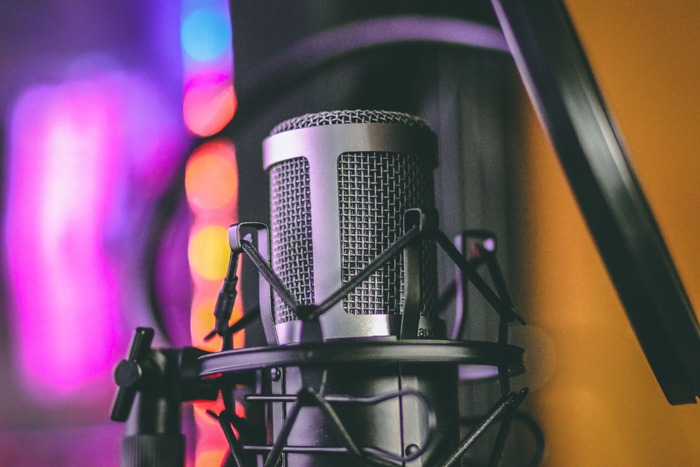Voiceover – what is it and how can you use it?
In this blog post we will go in-depth with the world of voiceovers and cover:
• What is a voiceover?
• What is difference between voiceover, speak, and narrator?
• What types of voiceovers are there?
• What effect do voiceovers have?
• The voice also has a meaning for your voiceover
• A voiceover is no better than its script

They’re there when you’re driving your car, when you’re at the movies, when you’re watching your favorite TV show, or when you need to call your insurance company. It can be anything from radio commercials and eLearning videos to film trailers and product videos, where a nice voice is conveying a message that you’ll remember, feel and can relate to. Maybe you don’t know it, but you’ve been listening to what we call a voiceover.
Confused about what a voiceover is? Or whether it is a speak that you need to use in your project? Or if it even makes sense to use speak? Then you have come to the right place. In this post, we will cover everything you need to know about voiceovers and their effect on a target audience so that your projects can stand stronger and become more effective and successful.
What is a voiceover?
A voiceover, also known as ‘voice over’ or ‘voice-over’, is a professional narration for film, television, theater, games, videos, or presentations recorded in a professional sound studio or home setup. The person who speaks can both be in the video or off-screen, and if the person who does the voice is professional, they are called voice artists or a voice actor.
There are generally two types of voiceovers:
The narrative voiceover: The voice describes the action on the video and tells a story based on what is happening.
The non-narrative voiceover: The voice is informative, instructive, and educational about what was shown on the screen.
It is important to understand that the work a voice artist does is not far from what an actor does when they have to say a line in a movie. A voiceover must essentially be delivered as a line, but unlike in film, you cannot use your body or face to sell the line. You only have your voice, which can make it significantly more challenging for the voice artist to convince their listeners.
What is the difference between voiceover, speak, and narrator?
Voiceover, speak, narrators – we have many names for the ones we love. Or do we really?
In Denmark, ‘voiceovers’ and ‘speak’ are often used interchangeably, as they cover the same thing. Narrator or narration, on the other hand, is not so widespread in the Danish language, as it is the English translation of the word used for a genuine narrator in films and books.
Voiceover and speak are closely related, yet have a notable difference, as speak is a broader term than voiceover. A speak is a professional speech in which no sound comes over anything else.
An example could be your answering machine (voice response system), which consists of pure speech, unless there is music underneath. For example, in the case of a voiceover for a documentary film or e-learning video, it is sound over images, and therefore it is a voiceover, as the voiceover is in relation to what is shown on the screen.
In VoiceArchive, we are not so fussy about whether we call one thing the other, but we primarily use voiceover, and we call our professional narrators voice artists.
What types of voiceovers are there?
On the face of it, a voiceover in itself is very fixed and consistent in its production and processes. However, the contexts in which they are used makes a difference. A voiceover can, for example, be used for:
- eLearning videos
- Advertising on the radio, TV, cinemas, and online
- Films, cartoons, and documentaries
- Videos such as product videos, image videos, how-to videos, and presentations
- Social media such as TikTok, YouTube, Instagram, Twitch, Vimeo, Facebook, and other social media platforms
- Voicemail message
- Gaming and computer games.

There are therefore many situations in which a voiceover can be used. And It is important for us to emphasize that these are just some of the many contexts where it can make sense to get a professional voiceover agency to help. There are many other projects where it would make sense, so feel free to call us if you are wondering or considering it.
What effect do voiceovers have?
Now you are probably thinking why you should invest in a voiceover and what effect it has on your projects and business. And the answer is probably more than you think. In addition to the fact that you are exposed to voiceover on a daily basis, they can both indirectly and directly have an influence on your perception of the sender, but also the message.
A well-chosen voiceover can:
- Establish trust and authenticity around a sender, a message, or a product
- Arouse different emotions in the target group that make them act
- Move a story forward and create a better understanding
- Help with the dissemination of information and knowledge
- Make the recipient remember better than if the message is just shown on a screen
The voice also has a meaning for your voiceover
You can’t just pick any voice for your voiceovers. This is because the sound of the voice will also have an influence on the message, as the feelings behind it will be reflected in the delivery.
For example, an energetic voice may be a good choice for promoting products, while a calmer voice is better suited for an explainer video or tutorial. A deep voice with a serious tone will be an obvious choice for an action film, as it will create excitement about the film and attract the right target audience to come to see the movie, but if you take the same voice and put it over a children’s program, it will turn the content into something comical and attract a completely different target group.
We will of course advise you on all this when you collaborate with us on your project.
A voiceover is no better than its script
No matter how perfectly suited the voice is for a project, it can’t get a message across if the script isn’t well thought out. Unfortunately, there are many who have the notion that it is best to have a loose script if you want to make dialogue or monologue flow more naturally.
But it rarely works well to make things up in real-time, as you would in a real conversation. Additionally, a voice artist will rarely sit in front of anything or anyone else other than the microphone they have to speak into.
That’s why it’s always a good idea to have it all written down word-for-word, rehearse it a few times, and then record it. The better and more thoroughly a script is worked through, the easier it will also be for the voice artist to say it and record it in a way where you can be satisfied with the result.

Do you need help finding the voice in your project?
No matter how much experience you have with the use of voiceovers, we are at your disposal during the process. At VoiceArchive, we have many years of experience in voiceovers, dubbing, and post-production, and a large database of artists who can master a plethora of different voices in more than 150+ languages, that you can handpick from. We also have a team of experts who can help you cast the perfect voice so that your project can be successful, and your message is delivered to perfection.